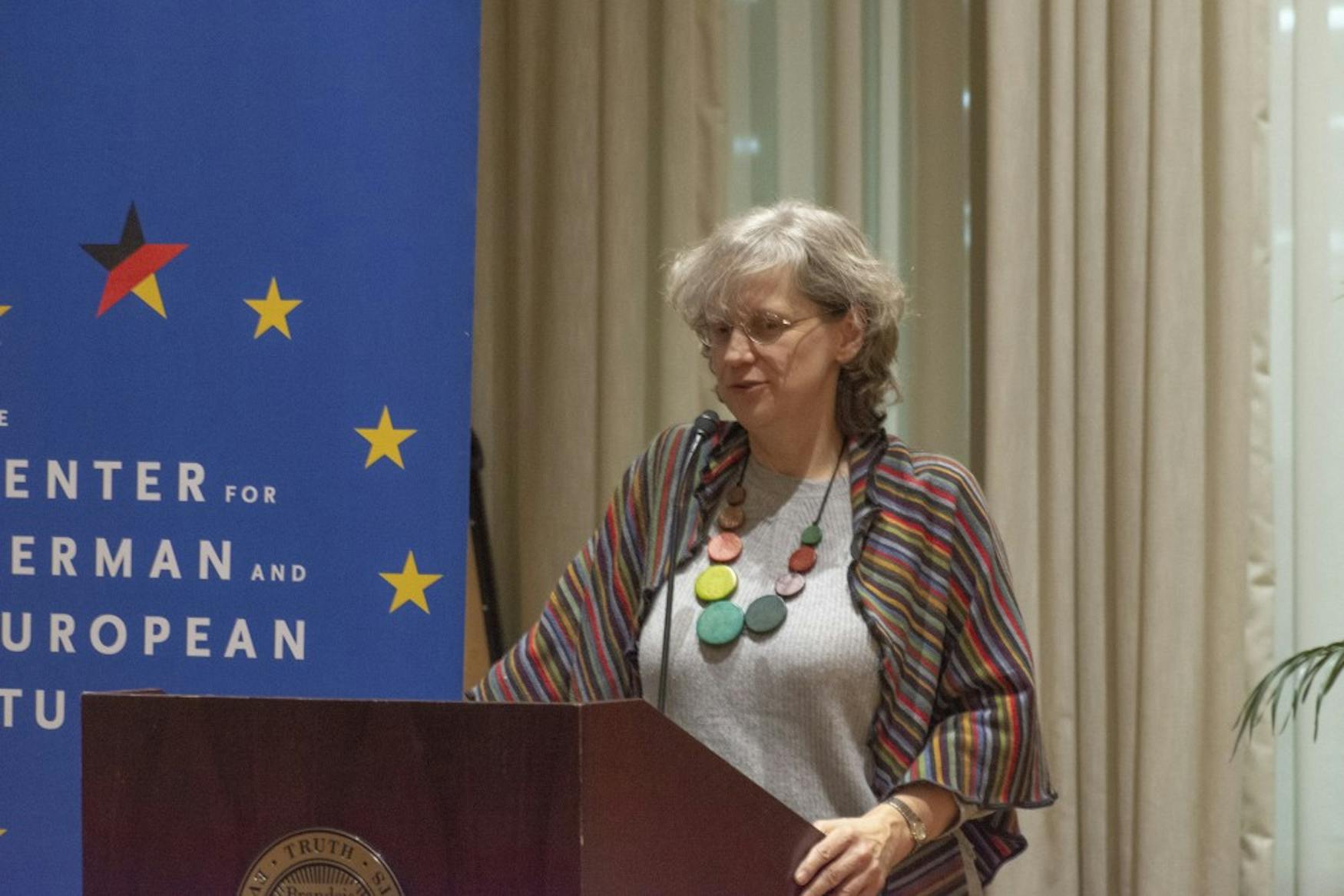German and Jewish students engage in Holocaust dialogue
The students discussed the impacts of the Holocaust on their perceptions of the German and Jewish peoples.
The Center for German and European Studies hosted its second annual “Let’s Talk About the Holocaust: German and Jewish Students in Dialogue” panel. The audience included Brandeis students and members of the local community, and a reception was held beforehand where attendees discussed the event to come.
The panel consisted of two Jewish students, two German students and a moderator. The Jewish students were Elan Kawesch ’20 and Jillian Fisch ’21. Kawesch is the head of the Jewish philanthropy organization Together Remembering Their Names, and Fisch is the vice president of the Brandeis Israel Public Affairs Committee. The German students, Felix Knodel and Mia Balk, are Christian volunteers on a gap year program Aktion Sühnezeichen, or Action Reconciliation Service for Peace. The two are living with Jewish host families and volunteering at Hebrew Senior Life, a center for the Jewish elderly. The panel was moderated by Benyamin Meschede-Krasa ’17, a German-Israeli Jew who has one grandfather who was a member of the Hitler Youth and another who survived the Auschwitz concentration camp.
The first question posed by Meschede-Krasa was, “What motivates you to work with Jewish elders?” Balk explained that as a German born generations after the Holocaust, she does not feel guilty, but she does feel a sense of responsibility — not necessarily to make up for the terrible events that transpired — but to get to know the culture and religion of the Jewish people.
Knodel said that coming from near Stuttgart, his community did not have a large Jewish presence, so by participating in the program, he hopes to further understand the history of the Holocaust and World War II and take steps towards continuing reconciliation between the German and Jewish people. Both Fisch and Kawesch explained that their work with the Jewish elderly was motivated by the knowledge that the number of Holocaust survivors alive today is dwindling, and that today’s American youth are not sufficiently informed about the Holocaust. A recent poll showed that two-thirds of millenials do not know what Auschwitz is, and 22 percent have never heard of the Holocaust. They hope that by learning the individual stories of survivors, they can educate their peers to prevent anything like the Holocaust from happening again.
The panelists were then able to ask each other questions. Fisch addressed the German students, explaining that as a Jew growing up in the United States, there were negative connotations attached to the German people. She recalled people in her community refusing to buy German cars or travel to Germany as a result of lingering resentment about the Holocaust.
Balk spoke about an experience she had at Hebrew Senior Life, where one of the seniors with whom she has a close relationship told her that they did not like Germans. She said that she understands on some level where this sentiment came from, but did not think it was productive to put all Germans into one box, especially younger generations who were born long after the Holocaust ended.
Balk directed the next question at the Jewish students, asking if there was any event in United States history that would move them to do a year of volunteering in another country as she and Knodel are doing in the United States. Both Kawesch and Fisch explained that, while there are many events in United States history that they find shameful, they themselves would not, saying that realistically speaking, this is not something that most Americans do.
An audience member then asked Balk and Knodel to explain specifically how the Holocaust is taught in German schools. Balk explained that every German student has to learn about it, and that teachers attempt to teach the events objectively — without censoring any details. Knodel added that he had been taught this history several times in school and noticed that his fellow classmates were not always engaged in the content. He speculated that because the Holocaust occurred so long ago, they felt that its lessons did not apply to them.
An Israeli audience member then asked to what degree younger generations are responsible for making amends for the actions of older generations. Kawesch said he thought that too much of a “blame-game” was taking place. While younger Germans are not responsible for the events of the Holocaust, he continued, Jews miss out on an opportunity to get to know them as humans on a personal level by harboring bias against them. This prevents valuable conversations about what happened, which are beneficial to all involved.
Balk noted that the fact that the Holocaust happened means that it could happen again. Because of this, she said, it is everyone’s responsibility to always be working for peace. To accomplish this, Fisch stated that people need to “be constructive and proactive.” She stressed the importance of not only discussing problems but taking action to correct them, but also humanizing those with different backgrounds or political views from your own to move forward together.



Please note All comments are eligible for publication in The Justice.